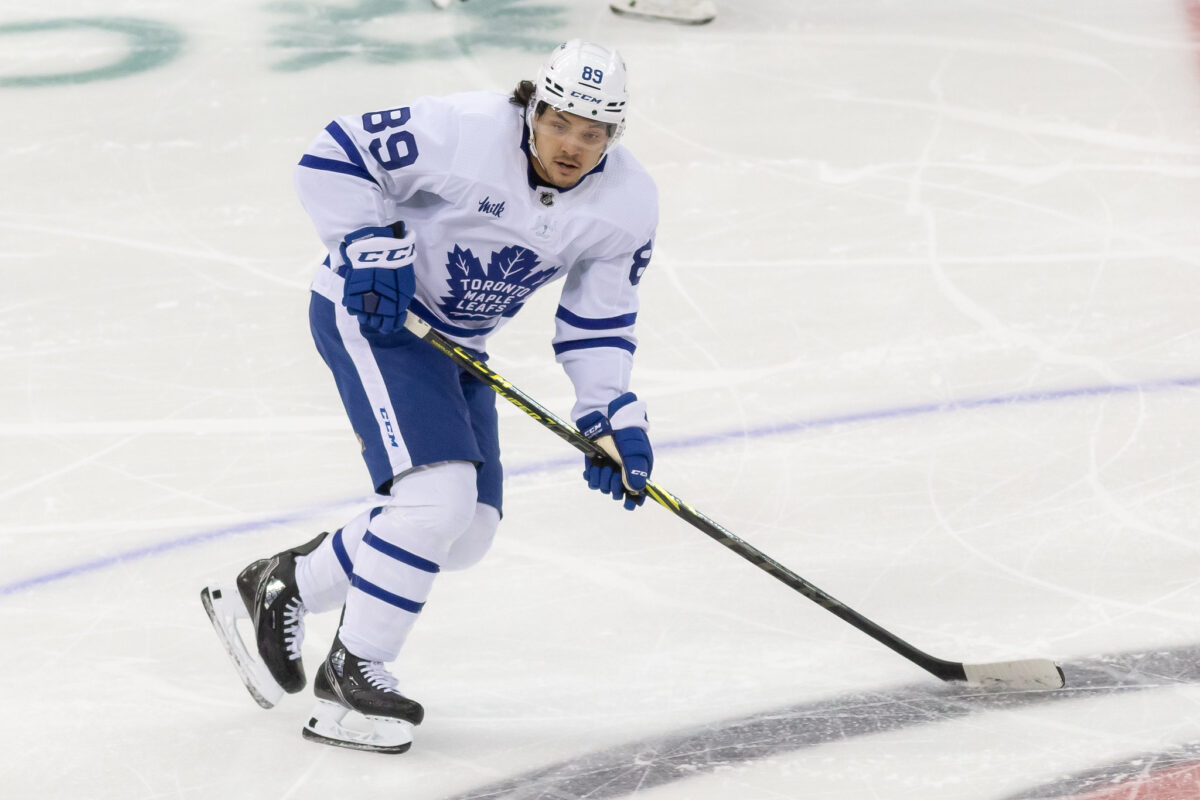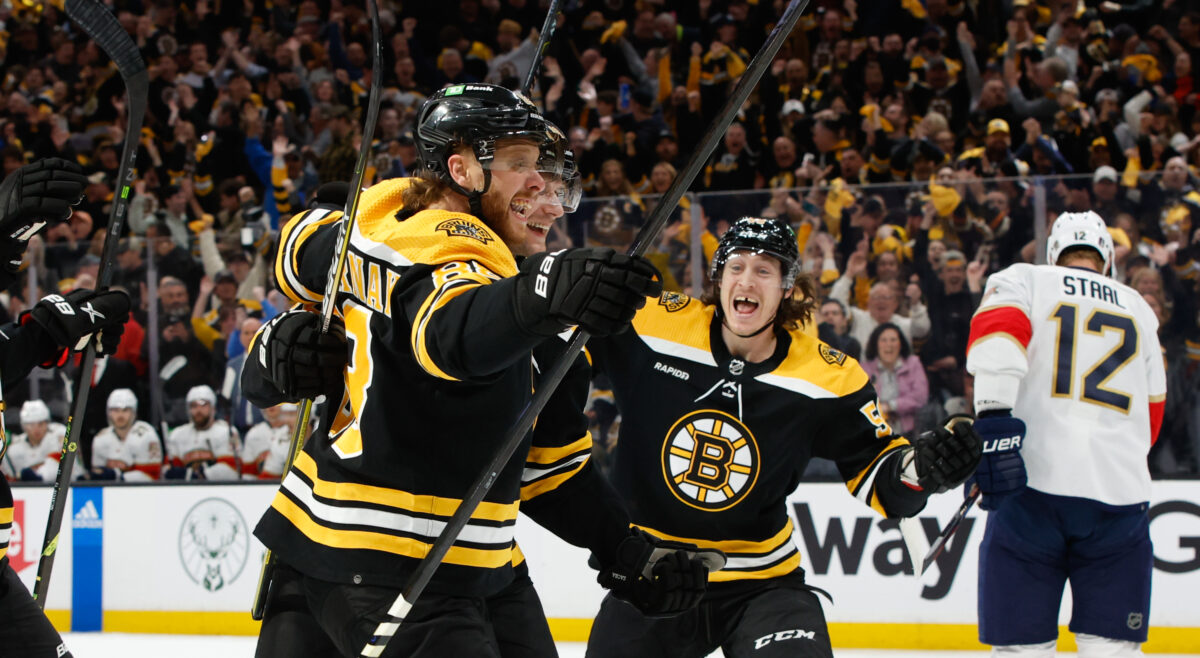I’m not sure if Tyler Bertuzzi is playing well or not. It could be me, but I expected more from him this season. I’m also guessing that Toronto Maple Leafs general manager (GM) Brad Treliving did, too.
We both likely expected someone who’s signed to a contract worth $5.5 million per season would be more visible on the ice or that his statistics should be more impressive.
Compared with Michael Bunting, Bertuzzi’s Behind
In an article on Jan. 1, Jonas Siegel compared Bertuzzi’s play to his predecessor Michael Bunting’s average over two seasons in Toronto. It doesn’t measure up (from “Monday Morning Leafs Report: Who should the Maple Leafs pursue to replace Ilya Samsonov? Jonas Siegel, The Athletic, 1/1/2023).
Bertuzzi’s on pace to score 15 goals and 19 assists (for 34 points). Bunting, in contrast, averaged 23 goals and 33 assists (for 56 points) during his two seasons with the Maple Leafs. Unless Bertuzzi picks it up a ton, his point total will be about the same as Bunting’s assist total for one season. Somehow, Bertuzzi is falling short.
Related: Battle of Maple Leafs Pests: Michael Bunting vs. Nazem Kadri
Bertuzzi has had every chance to put up bigger numbers. He’s almost spent every shift this season playing beside the best scorers in the top six. Yet, he ranks ninth on the team’s scoring chart with 14 points. Third-liner Calle Jarnkrok is ahead of him with 17 points, and Nick Robertson and Jake McCabe (a physical defenseman) are just behind him with 11 and 10 points, respectively.
Compared with Nick Robertson, Bertuzzi’s Behind
Taking a moment to compare Bertuzzi and Robertson, the following insights are clear from their individual stat lines.

This season, Bertuzzi, playing as a top-six left-winger, has played 34 games, scoring six goals and eight assists (for 14 points). He has put up a plus/minus rating of plus-4, and he’s taken 16 penalty minutes (PIM). Averaging 16:05 of ice time, Bertuzzi has scored two power-play goals and has added a power-play assist. His shooting percentage is 8.7%.
On the other hand, Robertson, who’s also playing as a left-winger, has played in 23 games, scoring five goals and six assists (for 11 points). Robertson has a plus/minus rating of plus-2, and he’s taken only a single minor penalty. Despite averaging only 10:37 of ice time, Robertson has a higher shooting percentage of 14.7%. He also gets some power-play time, but not much. Yet, he’s contributed one assist.
Related: Maple Leafs’ Harold Ballard: The Owner Who Perfected Greed
When Robertson is compared to Bertuzzi, it’s easy to see he’s been more efficient in his scoring chances, which is impressive, considering we’re comparing a seasoned veteran to a rookie. Bertuzzi has nine NHL seasons and 360 games under his belt. By contrast, Robertson has played parts of four seasons with 54 NHL games under his belt. Robertson’s statistics reflect a more notable offensive impact in two-thirds the number of games and two-thirds the number of minutes per game.
Finally, a closer look at Bertuzzi’s recent games reveals a concerning trend. He’s only scored one goal in the last 15 games and only has a single point more at five-on-five than Robertson. The stark contrast between his production in the top six and his position on the team’s scoring list is a bit head-scratching.
Bertuzzi’s Analytics Look Great, But Are They Trustworthy?
Interestingly, when we dig into Bertuzzi’s underlying metrics, they suggest we should be seeing something different on the scoresheet. He has an impressive 60 percent expected-goals clip. He’s even leading the team in this category. However, given his poor scoring rate, how reliable are these numbers? Has he caught someone else’s offensive wave and been riding it? The issue is that, despite a high expected goals mark, the advanced analytics are not translating into goals or points.
Related: Bo Horvat Has Replaced John Tavares as Mathew Barzal’s Mentor
Siegel’s article did note that Bertuzzi can have a “bowling-ball effect,” which is characterized by his physical and aggressive style of play. That’s true, and it flashes on and off during games that I’ve seen. Still, he doesn’t seem to be shooting much, and in the simplest sense, shooting has the most direct correlation to goal-scoring.
Lacklustre Regular Season, Big Playoff Success?
Last season, Bertuzzi had a so-so regular season (eight goals and 30 points in 50 games). He then, helped by regular power-play time, became a dynamo during the playoffs with the Boston Bruins, putting up five goals and five assists in seven games. He might do the same during this season’s playoffs as well.

I hope I’m surprised. However, right now, I do not see where it would magically come from.
Maple Leafs Fans Likely Expected More, I Did
The truth is that, before the season began, I predicted a big season for Bertuzzi. It hasn’t come to be. Now, I’m wondering if his performance is just going to be the way it is. If so, I’m likely not the only one fooled by what seemed like his potential with the team.
Related: 3 Toughest Maple Leafs Since 1990
Logic tells me that Bertuzzi isn’t contributing much to the team’s success. I keep waiting for him to elevate his game and add to his scoring and point totals; he has scored 30 goals in a season before. Right now, I’m just not seeing much from him, regardless of what the advanced analytics suggest, and that’s a cause for concern.
